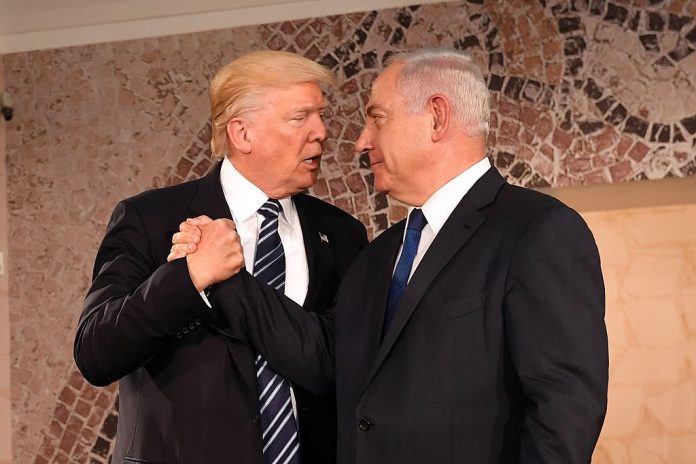The US President Donald Trump has recently come up with the much-anticipated ‘peace plan’ to resolve Palestine-Israel issue, the conflict of the century. The peace plan, providing for a two state solution to the conflict, promises a separate sovereign state for the Palestinians. However, the much-touted peace plan has been in bad taste, signaling more deterioration in the regional situation in the days to come.
To begin with, the Middle East Peace Plan (MEPP) has appeared at a time when Mr. Trump is on his way to re-election as the US president in November this year. Fearing a tough fight from the Democratic party, Trump through the Middle East plan appears poised to appeal to the pro- Democratic Jewish electorate of America by swinging the pendulum of the Israel-Palestine conflict in favor of Israel. Jerusalem has always been dependent on America’s backing in the region. That places Israel at an advantageous position among the region’s states, in particular against its arch rival Iran and Turkey.
Moreover, being a key ally of America, Israel has aptly survived under the regional and international pressure. It is here that MEPP can be seen as a handy tool for Trump to gain political mileage in the run up to his re-election.
Additionally, Israel’s premier Benjamin Netanyahu was alongside Trump when the latter announced the MEPP. Mr. Netanyahu himself is preparing for re-election this March. His political image and career has taken a strong beating in his home country and beyond – one for his alleged involvement in corruption and two for his high handed approach in dealing with Palestine. In such a situation, he is finding himself in a tough fight against his competitors for the country’s top post. Being a shrewd politician, Netanyahu understands that MEPP – which has mostly gone in favor of his country, can prove an effective political tool for him to not only convert the rage against him into affection but also to portray him a strong leader to have resolved the long pending conflict. This posturing by him can be seen as his desperation to regain power by gaining goodwill and sympathy of the electorate.
What Netanyahu apparently believes is that the MEPP can turn the tables for him and his opponents may find themselves on a sticky wicket to beat him in the upcoming national polls. Israel-Palestine conflict is a major international issue and the international community has a tough time in resolving it to the utter satisfaction of the warring parties. Netanyahu has played a strong card through the MEPP. He sent an important message that both Washington and Jerusalem are on the same page concerning Israel’s security and future. It has raised bright chances for him to retain the highest seat of power in Israel because he is due to be regarded as a strong leader in whose hands the Jewish state is secure.
Interestingly, the Trump-Netanyahu combination is focused on bouncing back following tough times in their present innings. To both of them, difficulties are not a concern – to them, the concern is to weather the storm. While a failed impeachment bid against Trump will at least affect his vote bank, Netanyahu faces a strong anti-incumbency wave at home. In this ordeal, they believe the MEPP can decrease the scale of their domestic opposition, projecting them as champions and guardians of peace and security.
Supporting Israel, as exemplified by the unfair MEPP, has other implications for America as well. Israel is a key player for Washington in the Middle Eastern region to contain its arch rival Iran. A strong and secure Israel places America in a stronger position to push Tehran on to the back foot. Resolving the Palestinian conflict can enable Washington to see Israel focused on Iran.
Most importantly, the US is looking for an honorable exit from Iran’s neighbor, Afghanistan. The US-Taliban battle has been going on for about nineteen years. The fierce war is yet to end. The Taliban and the US have done many rounds of negotiations in Doha in order to bring the conflict to an end. Although the conflict has witnessed an escalation in recent days with both Afghan troops – supported by the US – and the Taliban fighters losing lives, the talks have not stopped. In light of the US effort to withdraw its troops from Afghanistan, Trump’s MEPP can be seen as his gesture to inspire the Taliban that a Peace treaty is possible.
However, Trump’s MEPP – attended by no Palestinian representative- has failed to convince the Palestinians. They have rejected the plan, thus signaling bad days ahead for the region. For any peace process to be successful, the first step is to take all conflicting parties into confidence.
Notably, the peace plan has, for example, given the entire Jordan valley to Israel. Thus the Palestinian state would be surrounded with Israeli territory. Similarly, the entire city of Jerusalem has been given to Israel. There is nothing positive for the Palestinians in the plan. So the MEPP is bound to add fuel to fire, pushing the region into a vicious cycle of violence. On Thursday ( Feb 6) three Arabs were killed and a dozen Israeli troops were injured in attacks after the Trump administration released its Mideast plan. The Trump plan “created this environment of tension and escalation”, Nabil Abu Rdeneh, a spokesman for Palestinian President Mahmoud Abbas, told the official Palestinian news agency, WAFA. Will the Palestinian leadership come for talks now after the unfair Trump Plan? The Palestinians have dismissed the plan as “nonsense”, promising to resist it.
The views and opinions expressed in this article are those of the author and do not necessarily reflect the official policy or position of The Geopolitics.

Sheikh Shabir Kulgami is a Kashmiri (Indian) political commentator, analyst and columnist. He writes extensively on South Asia.


